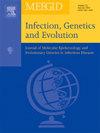Emerging genetic diversity of Mycoplasma gallisepticum in Mexican house finches: Evidence of possible independent spillover events
IF 2.6
4区 医学
Q3 INFECTIOUS DISEASES
引用次数: 0
Abstract
In a previous study, we reported for the first time the detection of Mycoplasma gallisepticum (MG) in Mexican house finches (Haemorhous mexicanus). Building on this finding, we explored the genetic diversity of MG, addressing the potential independent spillover events. Samples from 247 wild finches across Mexico revealed MG infection in 72 % of choanal swabs and 24 % of conjunctival swabs, with no clinical signs observed. Phylogenetic analysis identified two novel MG clades distinct from U.S. house finch-associated and poultry-associated MG strains, suggesting independent evolution within Mexico. Coinfections with diverse haplotypes were common, raising concerns about recombination and shifts in virulence. This research highlights the asymptomatic carrier state of Mexican house finches, their potential as reservoirs, and the ecological implications of pathogen spread and adaptation. These findings underscore the need for enhanced surveillance and further study on MG's dynamics in Mexican avifauna.
墨西哥家雀中出现的鸡败支原体遗传多样性:可能独立溢出事件的证据。
本文首次报道了在墨西哥家雀(Haemorhous mexicanus)中检测到鸡败支原体(Mycoplasma gallisepticum, MG)。在这一发现的基础上,我们探索了MG的遗传多样性,解决了潜在的独立溢出事件。来自墨西哥247只野生雀的样本显示,72% %的鼻拭子和24% %的结膜拭子感染MG,未观察到临床症状。系统发育分析鉴定出两个新的MG分支,不同于美国家雀相关的MG分支和家禽相关的MG分支,表明在墨西哥独立进化。不同单倍型的共感染很常见,这引起了人们对重组和毒力变化的担忧。本研究强调了墨西哥家雀的无症状携带者状态,它们作为宿主的潜力,以及病原体传播和适应的生态意义。这些发现强调了加强监测和进一步研究墨西哥鸟类中MG动态的必要性。
本文章由计算机程序翻译,如有差异,请以英文原文为准。
求助全文
约1分钟内获得全文
求助全文
来源期刊

Infection Genetics and Evolution
医学-传染病学
CiteScore
8.40
自引率
0.00%
发文量
215
审稿时长
82 days
期刊介绍:
(aka Journal of Molecular Epidemiology and Evolutionary Genetics of Infectious Diseases -- MEEGID)
Infectious diseases constitute one of the main challenges to medical science in the coming century. The impressive development of molecular megatechnologies and of bioinformatics have greatly increased our knowledge of the evolution, transmission and pathogenicity of infectious diseases. Research has shown that host susceptibility to many infectious diseases has a genetic basis. Furthermore, much is now known on the molecular epidemiology, evolution and virulence of pathogenic agents, as well as their resistance to drugs, vaccines, and antibiotics. Equally, research on the genetics of disease vectors has greatly improved our understanding of their systematics, has increased our capacity to identify target populations for control or intervention, and has provided detailed information on the mechanisms of insecticide resistance.
However, the genetics and evolutionary biology of hosts, pathogens and vectors have tended to develop as three separate fields of research. This artificial compartmentalisation is of concern due to our growing appreciation of the strong co-evolutionary interactions among hosts, pathogens and vectors.
Infection, Genetics and Evolution and its companion congress [MEEGID](http://www.meegidconference.com/) (for Molecular Epidemiology and Evolutionary Genetics of Infectious Diseases) are the main forum acting for the cross-fertilization between evolutionary science and biomedical research on infectious diseases.
Infection, Genetics and Evolution is the only journal that welcomes articles dealing with the genetics and evolutionary biology of hosts, pathogens and vectors, and coevolution processes among them in relation to infection and disease manifestation. All infectious models enter the scope of the journal, including pathogens of humans, animals and plants, either parasites, fungi, bacteria, viruses or prions. The journal welcomes articles dealing with genetics, population genetics, genomics, postgenomics, gene expression, evolutionary biology, population dynamics, mathematical modeling and bioinformatics. We also provide many author benefits, such as free PDFs, a liberal copyright policy, special discounts on Elsevier publications and much more. Please click here for more information on our author services .
 求助内容:
求助内容: 应助结果提醒方式:
应助结果提醒方式:


